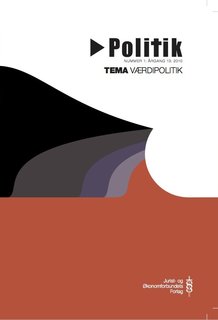Samfundets trosbekendelse
DOI:
https://doi.org/10.7146/politik.v13i1.27433Abstract
After World War II, there was broad consensus that schools in Denmark should educate for democracy. But there was no consensus on the role of the state: Should the state ensure that everyone receives a democratic education? Or should the state ensure pluralism, and remain neutral in relation to different life philosophies? Or must both the state and citizens develop a knowledgeable stance in relation to democracy’s fundamental dilemmas? It was without doubt the liberal position that became most influential in post-war Danish educational policy. The core of this strategy was that in a democracy the state should adopt a neutral stance towards the various philosophies of life. However, with the values-political turn of recent years the liberal position is now in retreat. This new trend became clear in 2000, with the then Minister of Education Margrethe Vestager’s manifesto Values in the Real World, in which she stressed that „Now more than ever we need to put in words just what attitudes and values we hold in common“. And the present government has focused on the same issue since 2001, and has commissioned among other things a literary canon, a cultural canon and a democracy canon. The activist values policies of recent years have once again given rise to a number of questions concerning democratic upbringing and the role of the state in efforts to strengthen society’s cohesiveness.
Downloads
Published
How to Cite
Issue
Section
License
Forfattere, der publicerer deres værker via dette tidsskrift, accepterer følgende vilkår:
- Forfattere bevarer deres ophavsret og giver tidsskriftet ret til første publicering, samtidigt med at værket er omfattet af en Creative Commons Attribution-licens, der giver andre ret til at dele værket med en anerkendelse af værkets forfatter og første publicering i nærværende tidsskrift.
- Forfattere kan indgå flere separate kontraktlige aftaler om ikke-eksklusiv distribution af tidsskriftets publicerede version af værket (f.eks. sende det til et institutionslager eller udgive det i en bog), med en anerkendelse af værkets første publicering i nærværende tidsskrift.
- Forfattere har ret til og opfordres til at publicere deres værker online (f.eks. i institutionslagre eller på deres websted) forud for og under manuskriptprocessen, da dette kan føre til produktive udvekslinger, samt tidligere og større citater fra publicerede værker (se The Effect of Open Access).

